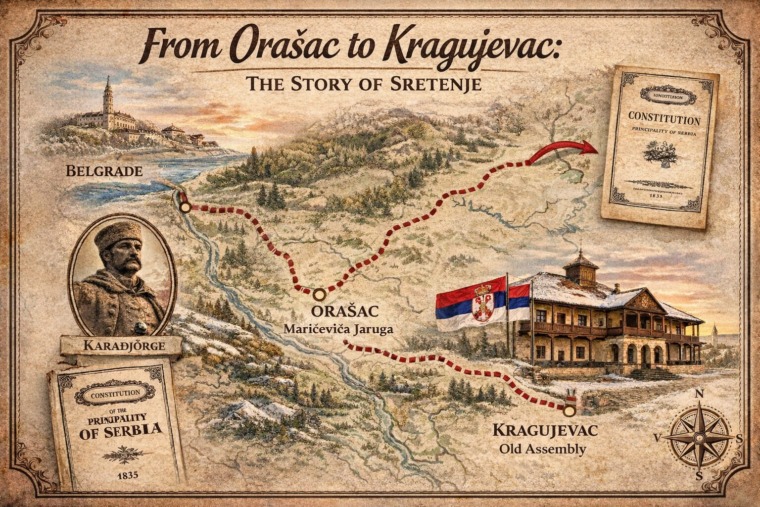

Serbia has produced a wealth of world-class athletes who have left an indelible mark on the global sports scene throughout the 20th century. From football and basketball to handball and athletics, these sportspeople not only dominated their respective fields but also helped shape the identity of Serbian sport on the international stage.
This article highlights 10 Serbian athletes whose extraordinary achievements made them icons, inspiring generations and leaving legacies that endure to this day.
1. Dragan Džajić (Football)
Dragan Džajić is widely regarded as one of the greatest Serbian footballers of all time. Playing as a left-winger, Džajić spent the majority of his career at Red Star Belgrade, where his dribbling skills and precise crosses became legendary.

He was named the best left-winger in the history of European football by France Football in 1969, and he remains one of the most iconic figures in Serbian and Yugoslav football history. Džajić represented the Yugoslav national team in 85 matches, scoring 23 goals, and was instrumental in reaching the final of the 1968 UEFA European Championship.
2. Vlade Divac (Basketball)
Vlade Divac is a trailblazer in basketball, both in Europe and the United States. As a member of the golden generation of Yugoslav basketball, he was known for his versatility, playmaking abilities, and leadership on the court.

Divac won numerous championships with the Yugoslav national team, including a gold medal at the 1990 FIBA World Championship. He was also one of the first European players to make a significant impact in the NBA, where he played for teams such as the Los Angeles Lakers and the Sacramento Kings, helping pave the way for future European stars.
3. Monica Seles (Tennis)
Monica Seles was born in Novi Sad, Serbia, and became one of the dominant forces in women’s tennis in the early 1990s. She burst onto the scene with her aggressive playing style, especially her two-handed strokes from both sides.

By the age of 19, Seles had already won eight Grand Slam titles, establishing herself as a top player. Although a tragic on-court stabbing in 1993 halted her rise, she made a remarkable comeback and continued to be a force in tennis. Her career and achievements are often celebrated as one of the greatest in women’s tennis.
4. Aleksandar Šoštar (Water Polo)
A key figure in the history of Serbian and Yugoslav water polo, Aleksandar Šoštar is considered one of the best goalkeepers in the sport. He played a crucial role in Yugoslavia’s success during the late 20th century, winning an Olympic gold medal in 1988 in Seoul and multiple World and European Championships.

Šoštar’s reflexes, agility, and leadership made him a cornerstone of his teams for many years, and he remains an influential figure in water polo even after retiring, as a sports administrator and advocate for the sport.
5. Radivoj Korać (Basketball)
Radivoj Korać is a legendary figure in European basketball, known for his prolific scoring ability. Playing during the 1960s, Korać dominated the European basketball scene, and his legacy includes a 99-point game in a European Cup match in 1965, which remains one of the highest scoring performances in basketball history.

Korać was a member of the Yugoslav national team, with whom he won silver medals at both the World Championship and the Olympics. His untimely death in a car accident in 1969 cut short what could have been an even more illustrious career.
6. Dragutin Topić (Athletics)
Dragutin Topić is one of Serbia’s most renowned high jumpers. He burst onto the international scene in 1990 when, at the age of 19, he won the gold medal at the European Championships in Split, setting a world junior record in the process with a jump of 2.37 meters.

Topić competed in multiple Olympic Games and World Championships, consistently representing Serbia and achieving notable success. His contribution to athletics, particularly in field events, marked him as one of Serbia’s greatest track and field athletes.
7. Dražen Dalipagić (Basketball)
Dražen Dalipagić is another iconic figure in Serbian and Yugoslav basketball. Known for his incredible scoring ability and athleticism, Dalipagić was a key player during the 1970s and 1980s. He helped Yugoslavia win numerous medals in international competitions, including gold at the 1978 FIBA World Championship and several European Championships.

Dalipagić was also a three-time Olympic medalist, further cementing his legacy. He played for teams across Europe, including Partizan Belgrade, where he became a beloved figure for his on-court brilliance.
8. Rajko Mitić (Football)
Rajko Mitić is a legendary figure in Serbian football history and is remembered as one of Red Star Belgrade’s greatest players. Mitić was a versatile forward who captained both his club and the Yugoslav national team during the 1940s and 1950s.

He played in two World Cups (1950, 1954) and won five Yugoslav league titles with Red Star. Known for his sportsmanship and leadership, Mitić is still revered in Serbian football culture, and Red Star’s stadium is named in his honor—Stadion Rajko Mitić.
9. Borislav Stanković (Basketball Executive)
Borislav “Bora” Stanković is one of the most influential figures in the history of international basketball, not just for Serbia but globally. A former player, Stanković transitioned into administration and became a key figure in FIBA (the International Basketball Federation).

As Secretary General of FIBA from 1976 to 2002, he played a crucial role in unifying the basketball world, advocating for the inclusion of NBA players in the Olympics, and expanding the sport globally. His influence in shaping modern basketball earned him recognition and respect worldwide.
10. Svetlana Kitić (Handball)
Svetlana Kitić is widely regarded as one of the best female handball players of all time. She was named the best female handball player of the 20th century by the International Handball Federation (IHF).

Kitić was a dominant force on the court, known for her playmaking ability, vision, and goal-scoring prowess. She led Yugoslavia to a gold medal at the 1984 Olympics and numerous other international successes. Kitić’s impact on the game is still felt today, and she inspires young athletes.
Related Articles


5 Little Things in Serbia That Travelers Never Forget
February 20, 2026
Interesting Facts About Sretenje You May Not Know
February 16, 2026






